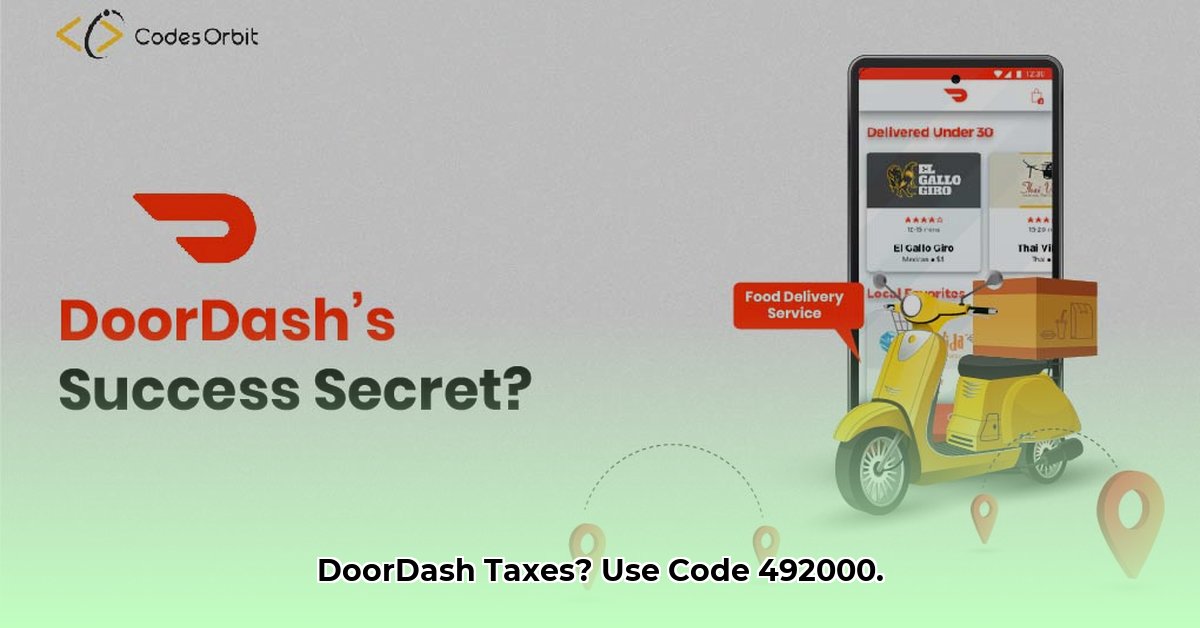This guide explains how to use the correct business code – 492000 (Couriers and Messengers) – when filing your 2024 taxes as a DoorDash driver. We’ll provide a step-by-step guide for completing Schedule C and address common tax questions.
Understanding Your DoorDash Tax Obligations
As a DoorDash driver, you’re considered an independent contractor, meaning you’re responsible for paying self-employment taxes. These taxes cover Social Security and Medicare and are calculated at a rate of 15.3% of your net earnings. Planning for this expense is crucial for managing your finances effectively.
Decoding the 1099-NEC
If your DoorDash earnings reach $600 or more in 2024, you’ll receive a 1099-NEC form in early 2025. This form details your income as an independent contractor. You can typically access it electronically through Stripe Express or your Dasher app. Ensure the tax information in your Dasher app is accurate to avoid any issues.
Schedule C: Your Profit or Loss Statement
Schedule C (Form 1040) is where you report your DoorDash income and deduct business expenses. Even if you take the standard deduction, completing Schedule C is important, as it unlocks potential deductions like mileage, vehicle expenses, and other business-related costs.
Using Business Code 492000: A Step-by-Step Guide
The six-digit code 492000 (Couriers and Messengers) informs the IRS about the nature of your DoorDash activity. Using the correct code ensures accurate tax filing and may reduce the risk of issues with the IRS.
Step 1: Obtain Schedule C: Download Schedule C from the IRS website (https://www.irs.gov/) or access it through tax software.
Step 2: Describe Your Business: On Schedule C, describe your activity concisely, such as “Food Delivery Driver” or “Independent Delivery Contractor.”
Step 3: Enter the Code: Locate the “Principal Business or Professional Activity Code” box (Line B) on Schedule C and enter 492000.
Maximizing Deductions and Managing Expenses
Accurately tracking your expenses is crucial for minimizing your tax burden.
Mileage Tracking
Track every mile driven for deliveries (excluding your commute). While DoorDash may provide mileage estimates, maintaining your own records throughout the year is recommended. Mileage tracking apps can simplify this process. For 2024, the standard mileage rate is 65.5 cents per mile.
Other Deductible Expenses
Several other DoorDash-related expenses are potentially deductible:
- Vehicle Expenses (if not using standard mileage deduction): A portion of your gas, repairs, oil changes, insurance, and other vehicle expenses may be deductible if you don’t take the standard mileage deduction.
- Phone and Internet: Part of your phone and internet bills may be deductible, as these are essential for your work.
- Hot Bags and Delivery Gear: Deduct the cost of insulated bags, and other delivery supplies.
- Tolls and Parking Fees: Tolls and parking fees incurred during deliveries are deductible.
- Other Business Expenses: This might include roadside assistance (business portion), background check fees, and tax software.
Common DoorDash Tax Questions
Here are some frequently asked questions about DoorDash taxes:
- Do I need a business name? No, using your legal name is acceptable. However, if you’ve registered a business name, use that instead.
- Can I deduct health insurance premiums? As a self-employed individual, you may be able to deduct health insurance premiums. Consult IRS Publication 502 or a tax professional.
- What is the QBI deduction? The Qualified Business Income (QBI) deduction may allow you to deduct up to 20% of your qualified business income. Eligibility and limitations apply, so consult a tax professional.
- Can I deduct self-employment taxes? Yes, you can deduct one-half of your self-employment tax liability. This is an important deduction to remember.
Seeking Professional Guidance
Navigating tax laws can be challenging. Consult a qualified tax professional for personalized advice and guidance. They can help you ensure you’re taking all applicable deductions and meeting your tax obligations.
Disclaimer: This information is for educational purposes only and does not constitute legal or tax advice. Consult with a qualified tax professional for personalized guidance tailored to your specific situation.
- How to Stop Apps From Running in the Background to Boost Your - December 1, 2025
- How To Move Apps On Your Droid For Better Organization - November 30, 2025
- How to Move Apps on Android for Better Organization - November 29, 2025










